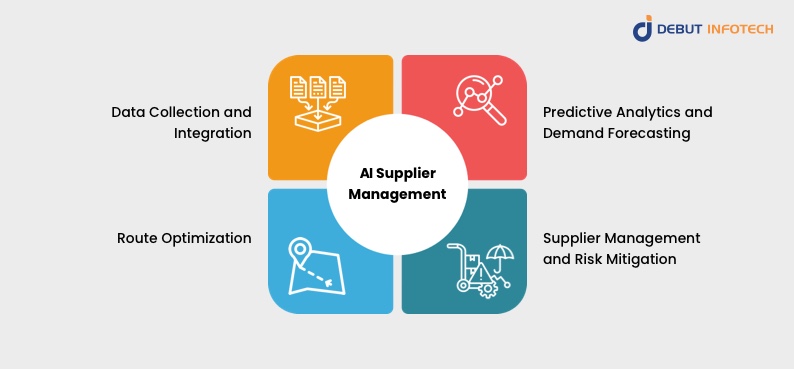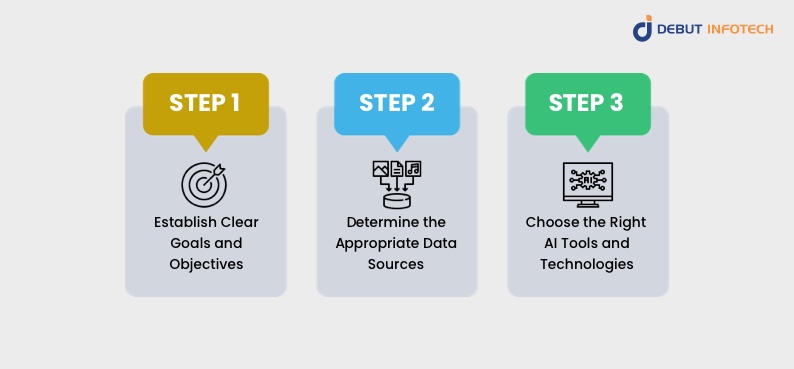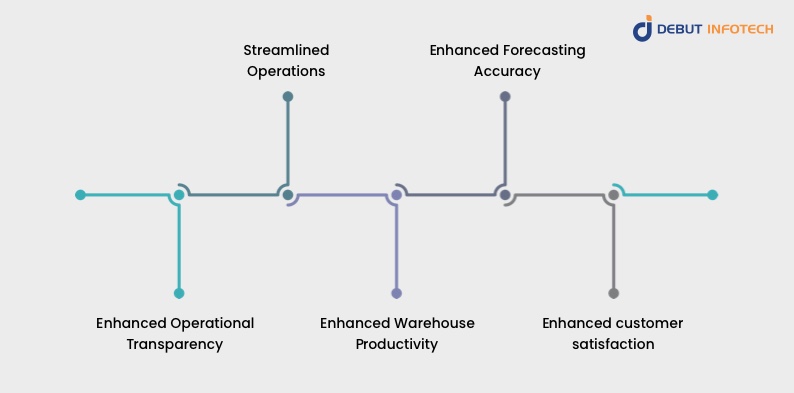Table of Contents
Home / Blog / AI/ML
Why AI in Supplier Management is the Future of Supply Chain Success
February 6, 2025

February 6, 2025
Supply chain disruptions cost businesses an estimated $1.6 trillion annually, with 80% of companies acknowledging their current strategies are ineffective, according to McKinsey. The solution? AI supplier management.
Siemens managed to decrease disruptions by 45% by implementing AI to anticipate potential risks. Similarly, Unilever has automated over 30,000 supplier audits, resulting in a 70% reduction in manual effort. These aren’t outliers—tools like predictive analytics and AI contract negotiators are now accessible, not aspirational.
Here’s what AI delivers today:
- Forecasting delays with real-time information.
- Automatically negotiate contracts based on prevailing market standards.
- Develop flexible networks capable of adapting rather than simply failing.
This article reveals how to turn AI supplier management from a mere trend into tangible, profitable outcomes—before the next disruption hits.
How AI Supplier Management Translates Risk into Revenue
From supplier onboarding to risk management, here’s how AI turns supply chain vulnerabilities into profit engines.
1. Supplier Onboarding
AI optimizes the onboarding process by automatically extracting and validating supplier data from diverse documents. Automation eliminates manual data entry, reducing errors and ensuring fast, efficient supplier onboarding. Accelerated onboarding timelines enable companies to collaborate with new suppliers more rapidly, sustaining a seamless supply chain.
2. Supplier Performance Evaluation
Artificial intelligence employs predictive analytics to evaluate supplier performance based on historical data. Through predictive analytics, businesses can make data-driven decisions regarding which suppliers to prioritize, renegotiate terms with, or replace. This facilitates the retention of only top-performing suppliers, thereby enhancing overall efficiency and dependability.
3. Risk Management
AI helps businesses identify and mitigate supplier risks proactively. It does this by continuously tracking data like financial metrics, geopolitical occurrences, and sector developments with the integration of LLM models and natural language processing. Real-time risk assessments help companies proactively address issues like a supplier’s financial instability or regulatory non-compliance, preventing disruptions. Consequently, this strengthens the supply chain’s resilience and stability.
4. Optimizing Procurement Processes
Through the analysis of past purchasing patterns, market dynamics, and supplier efficacy, AI empowers organizations to make procurement choices grounded in data. It facilitates the discovery of avenues for cost reduction, the negotiation of superior contractual terms, and the selection of the most dependable suppliers. AI insights help businesses optimize procurement, ensuring long-term cost efficiency and supply chain stability.
5. Automated Invoice Handling and Payment
AI streamlines the handling of invoices and payment procedures, guaranteeing precision and effectiveness. AI automates data entry and validation, reducing errors and speeding up payments.. Businesses using AI development services can implement AI-driven payment workflows for increased accuracy and efficiency.
Are you ready to revolutionize your supplier management with AI?
Let Debut Infotech help you implement AI-driven solutions tailored to your needs.
AI Supplier Management: How It Works and Why It Matters
AI analyzes large amounts of data, detects patterns, and predicts outcomes, improving supplier management and decision-making. Here’s how it generally functions in the context of supply chain management:

1. Data Collection and Integration
The initial phase involves data collection. Artificial intelligence systems within supply chains amass information from a variety of sources, including tools for supply chain visibility, Internet of Things (IoT) sensors, and Enterprise Resource Planning (ERP) systems. This information may encompass details regarding inventory levels, transportation routes, order statuses, supplier performance, and even external elements such as weather patterns or geopolitical occurrences.
Subsequently, this information is incorporated into an AI-powered platform where it undergoes processing and analysis. Real-time access to consolidated data enables faster decision-making and improves operational efficiency.
2. Predictive Analytics and Demand Forecasting
Artificial intelligence leverages sophisticated algorithms to anticipate future demand by examining past data and recognizing trends. Predictive models generate accurate forecasts by analyzing customer behavior, seasonal trends, and market dynamics. For instance, AI-powered demand forecasting empowers companies to foresee which items will experience significant demand and proactively modify their inventory levels and manufacturing timelines.
AI tools enable real-time inventory tracking, and when integrated with predictive analytics, firms can prevent either insufficient stock or excessive inventory accumulation, thereby enhancing overall process effectiveness.
3. Route Optimization
Artificial intelligence significantly contributes to the enhancement of logistics and transportation management. Through the analysis of real-time information such as traffic flow, weather conditions, and delivery schedules, AI can recommend the most effective routes for delivery drivers. Consequently, businesses can integrate AI chatbot development tools to automate communication between suppliers and logistics teams, ensuring seamless coordination.
Furthermore, AI-driven tools can automate the process of route planning, considering factors like the number of packages to be delivered, distances, and delivery time frames. These tools enhance logistics efficiency and ensure timely deliveries without delays.
4. Supplier Management and Risk Mitigation
AI enhances supplier oversight and reduces risk through generative AI models to forecast supplier effectiveness and potential hazards. By examining past supplier information, AI uncovers trends that might indicate possible supply chain delays or complications, enabling companies to act preemptively to resolve these issues before they worsen.
For instance, AI can highlight suppliers that consistently struggle with on-time deliveries and suggest substitute suppliers, aiding businesses in preventing interruptions. Effective supply chain risk management is paramount, and AI’s capacity to anticipate and lessen risks provides companies with a competitive advantage by enabling them to stay resilient in a swiftly evolving global market.
AI Supplier Management Use Cases: Real-World Applications Driving Efficiency
From procurement to supplier risk management, AI development companies are reshaping supplier interactions. The following examples illustrate how AI improves efficiency, minimizes risks, and refines decision-making in supplier management.
1. Inventory Management
AI transforms inventory management by tracking stock levels in real-time, pinpointing inefficiencies, and automating the replenishment process. It optimizes inventory distribution across warehouses to guarantee quicker delivery, reduced operational expenses, and a smooth customer experience.
- Illustrative Case:
Amazon employs AI to automate restocking and tactically place inventory within its fulfilment centres. This ensures products are readily accessible, minimizes delivery times, and boosts customer satisfaction while keeping operations cost-efficient.
2. Demand Forecasting
Using AI for supply management, businesses predict market demands more accurately, adjusting stock levels proactively. This accuracy allows companies to foresee their inventory requirements precisely, minimizing excess stock, averting stock shortages, and guaranteeing efficient resource distribution.
- Illustrative Case:
Walmart utilizes AI to scrutinize both real-time and historical data, meticulously adjusting its inventory levels to align with customer demand. By maintaining well-stocked shelves with appropriate products, Walmart boosts operational efficacy, diminishes waste, and elevates customer satisfaction.
3. Dynamic Demand-Supply Balancing
AI continuously analyzes market trends, customer behavior, and supply chain constraints to balance supply and demand in real-time. It adjusts production schedules, inventory levels, and distribution strategies in real-time to optimize resources, reduce costs, and meet customer demand efficiently.
- Illustration case:
Procter & Gamble employs AI to observe demand trends and modify production and distribution instantaneously. This method diminishes waste, guarantees product accessibility, and enhances responsiveness to the demands of retailers, thereby boosting the overall suppleness and efficiency of the supply chain.
4. Carbon Footprint Reduction
Artificial intelligence enables companies to lessen their environmental effect by examining transportation, energy use, and packaging throughout the supply chain. It pinpoints areas of waste and suggests practical solutions for lowering emissions and meeting sustainability objectives.
- Illustration case:
Unilever uses AI to refine its transportation system, opting for routes and transportation modes that are environmentally friendly, thus cutting carbon emissions without compromising delivery schedules. This strategy integrates operational effectiveness with environmental responsibility, boosting both ecological and corporate success.
5. Independent Supply Chain Functions
Artificial intelligence is transforming supply chain management through the implementation of independent operations within warehouses and logistics. AI-powered robots handle tasks like picking, packaging, and inventory management, while autonomous trucks improve efficiency and reduce transport costs.
- Illustration case:
FedEx is currently testing self-governing delivery trucks powered by AI to refine last-mile logistics. These vehicles guarantee quicker, more dependable deliveries while cutting back on labor expenses and streamlining operations, establishing a benchmark for supply chain advancements.
6. Fraud Prevention in Procurement Processes
Artificial intelligence strengthens procurement security by examining transactions and identifying unusual patterns, including inconsistent supplier pricing, duplicate billing, or unauthorized acquisition of goods or services.
AI consulting firms help companies prevent fraud, protect assets, and comply with regulations by detecting risks in real-time.
- Illustrative Case:
IBM incorporates AI into its procurement infrastructure to pinpoint questionable actions, such as exaggerated pricing or recurring invoicing trends. This forward-thinking strategy guarantees clarity, lessens the chances of fraud, and reinforces the overall integrity of the procurement function.
How to Implement AI Supplier Management for Maximum Efficiency

1. Establish Clear Goals and Objectives
For effective AI supplier management, businesses must define their goals. They must pinpoint the precise issues they intend to resolve, be it the automation of supplier onboarding processes, the refinement of risk evaluation, or the streamlining of procurement choices.
Businesses should also set measurable success indicators, such as faster supplier response times or lower procurement costs. A thoroughly outlined plan guarantees the selection of appropriate AI instruments and technologies aligned with your company’s requirements.
2. Determine the Appropriate Data Sources
To achieve peak efficiency in AI-driven supply management systems, top-tier data is essential. Begin by pinpointing the most pertinent internal data repositories, including customer relationship management (CRM) platforms, financial documents, procurement details, and supplier performance evaluations.
Furthermore, tap into external data streams such as market analyses, sector news, and geopolitical intelligence to augment the decision-making process. Verify that all data is precise, pertinent, and current, given that the efficacy of AI relies on the caliber of information it analyzes. A meticulously organized data approach empowers AI to produce dependable insights, refine supplier partnerships, and elevate supply chain performance as a whole.
3. Choose the Right AI Tools and Technologies
Selecting appropriate AI tools and technologies is crucial for the effective implementation of AI-driven supplier management, aiming for peak efficiency. Various AI solutions present distinct functionalities, including machine learning algorithms designed for analyzing supplier performance, natural language processing (NLP) for communication automation, and predictive analytics for evaluating risks.
Leading platforms such as H2O.ai, Microsoft Azure AI, and TensorFlow deliver strong AI features specifically suited for supply chain management. When assessing AI solutions, take into account aspects like cost-effectiveness, scalability, and integration simplicity to confirm their compatibility with your business requirements and your long-range supplier management objectives.
Why AI Supplier Management is a Game-Changer for Businesses
Some benefits of using AI in supplier management include:

- Enhanced Operational Transparency
Artificial intelligence (AI) offers enhanced insight into supply chain operations due to its ability to analyze vast datasets.
For instance, AI can aggregate data from various sources such as distributors, AI suppliers, and inventory warehouses as users input it, furnishing supply chain managers with crucial details like stock levels, raw material costs, and available transportation options.
This heightened transparency can result in numerous benefits, including more precise delivery monitoring, quicker pinpointing of bottlenecks, and a reduction in supply chain disruptions.
Furthermore, AI’s capabilities can strengthen supplier relationships. With faster and more accurate information flow throughout the supply chain, communication between suppliers becomes more efficient.
- Streamlined Operations
Artificial intelligence can pinpoint opportunities for enhancement throughout the supply chain, thus helping to minimize inefficiencies.
AI can examine supply chain procedures and highlight areas for advancement, potentially leading to cost reductions and faster completion times for specific processes and ML applications. AI may be a better fit than a human employee for carrying out tasks like analyzing large amounts of data.
- Enhanced Warehouse Productivity
Artificial intelligence can enhance warehouse productivity through several methods.
AI optimizes warehouse layouts by analyzing shelf space and employee movement, suggesting improvements. It can also recommend optimal inventory placement to prevent traffic jams, thereby enabling staff to process orders more rapidly.
Furthermore, AI algorithms can contrast inventory data with demand data to ascertain the appropriate stock levels a company should maintain. This evaluation can help minimize both stock deficiencies and surpluses, leading to better control of company expenditures and more efficient overall operations.
- Enhanced Forecasting Accuracy
AI algorithms possess the ability to analyze datasets, discern patterns, and forecast the future behavior of these patterns. This functionality allows users to gain deeper insights into customer behavior and anticipate market trends.
For instance, predictive analytics can analyze customer purchasing patterns to pinpoint the probable timing of a surge in demand, enabling supply chain managers to plan proactively.
- Enhanced customer satisfaction
Advantages derived from AI, including enhanced delivery transparency and heightened inventory accessibility, will contribute to the enhancement of customer satisfaction, and the functionalities of natural language processing could further enhance customer support.
AI chatbot development improves supplier communication by addressing customer inquiries outside of business hours when conventional customer support channels might be unavailable, and these chatbots can suggest products tailored to previous customer transactions, proving beneficial for shoppers.
Start your AI transformation today
Let’s discuss how Debut Infotech can help you achieve efficiency and scalability.
AI Supplier Management Made Easy: How Debut Infotech Can Help
Implementing AI supplier management can be complex, but with the right expertise, businesses can unlock its full potential. Debut Infotech specializes in AI development services that enhance supplier management through cutting-edge AI solutions.
Here’s how we can help:
- Custom AI Solutions for Supplier Management
At Debut Infotech, we develop tailored AI solutions that align with your business needs. Whether it’s predictive analytics for supplier performance, AI agents for risk assessment, or ML applications for procurement optimization, our expertise ensures you get the best AI-driven tools for supplier management.
- Automated Supplier Onboarding and Verification
We leverage natural language processing (NLP) and AI models to automate document verification, supplier data extraction, and compliance checks. This reduces manual efforts, eliminates errors, and speeds up supplier onboarding, ensuring a seamless start to supplier relationships.
- AI-Driven Risk Management
Using real-time data analytics, our AI agents monitor supplier risks, including financial instability, regulatory compliance, and geopolitical factors. This proactive approach helps businesses avoid supply chain disruptions and maintain supplier reliability.
- Scalable and Future-Ready AI Solutions
Our AI development services provide scalable AI models that grow with your business. Whether you need LLM models for supplier negotiations or predictive analytics for supply chain forecasting, we build AI-driven systems that adapt to evolving business needs.
Final Thoughts
Proper handling of suppliers is crucial for contemporary companies to thrive, serving as a key element in the steady provision of top-tier products and services. Evaluating suppliers against clear standards ensures product quality and minimizes supply chain risks and disruptions.
With Debut Infotech, AI supplier management becomes effortless. Our AI-powered solutions enhance efficiency, reduce risks, and optimize supplier relationships, giving your business a competitive edge.
Frequently Asked Questions (FAQs)
A. Implementing AI in the supply chain can be costly due to technology expenses, staff training, integration challenges, security risks, and over-reliance on automation.
A. Notwithstanding this possibility, AI is unlikely to fully supplant humans in supply chain management, at least in the foreseeable future.
Talk With Our Expert
Our Latest Insights
USA
2102 Linden LN, Palatine, IL 60067
+1-703-537-5009
[email protected]
UK
Debut Infotech Pvt Ltd
7 Pound Close, Yarnton, Oxfordshire, OX51QG
+44-770-304-0079
[email protected]
Canada
Debut Infotech Pvt Ltd
326 Parkvale Drive, Kitchener, ON N2R1Y7
+1-703-537-5009
[email protected]
INDIA
Debut Infotech Pvt Ltd
C-204, Ground floor, Industrial Area Phase 8B, Mohali, PB 160055
9888402396
[email protected]




Leave a Comment